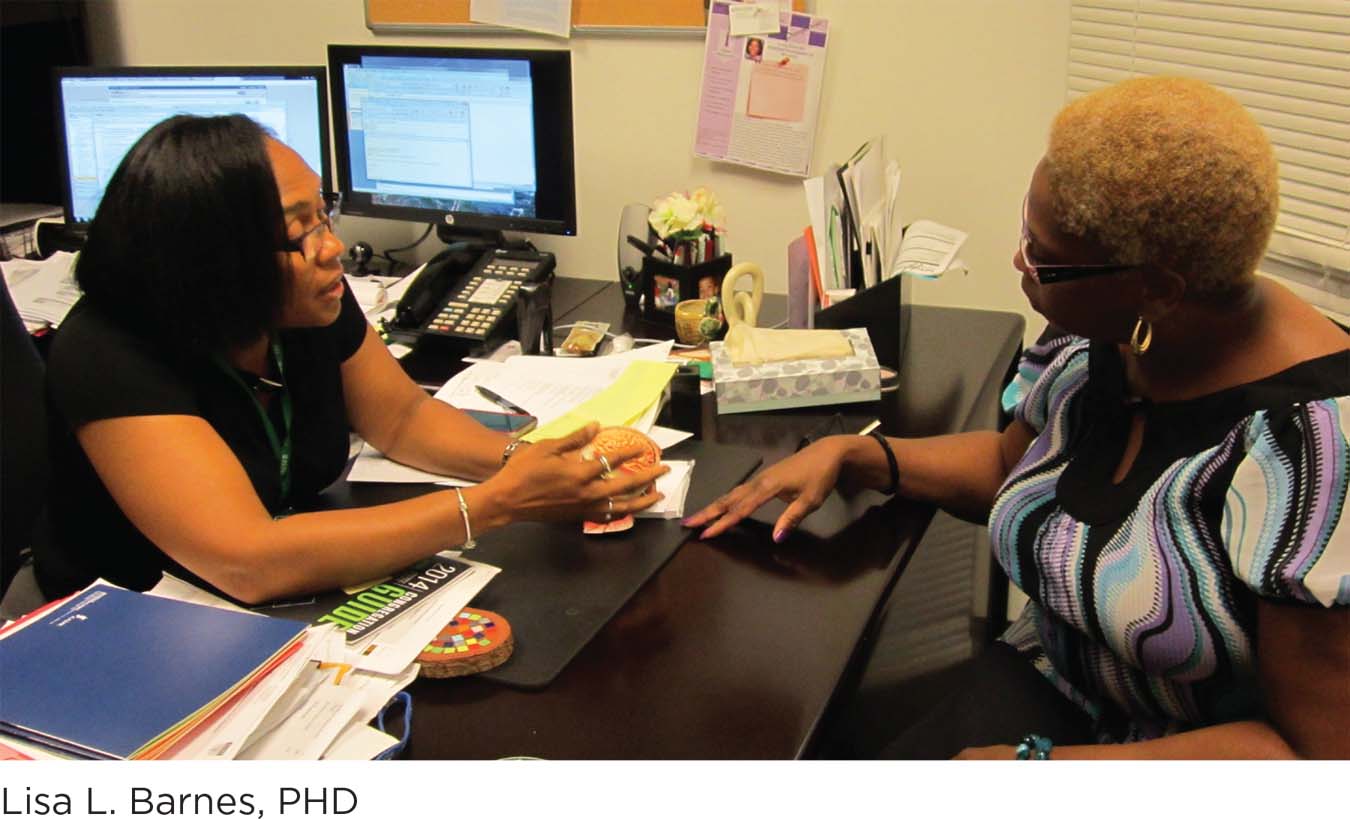Subfields of Psychology
Psychologists provide treatment for people with mental disorders, examine cognitive processes, study changes across the life span, work with children in schools, help corporations develop marketing strategies, and much more. Let’s explore careers in some of the subfields of psychology.

With a budget of only $3,000, Dr. Tamara Russell launched an innovative mental health program at Washington State Penitentiary in Walla Walla, WA. Her treatment program provides inmates with opportunities to help others—
Clinical Psychology
Clinical psychologists focus on the diagnosis and treatment of people with psychological disorders. In addition to providing therapy, many of these professionals also conduct research. They may, for example, use brain scanning technologies to better understand the causes of depression, or design studies to compare the effects of different treatments. Some work as professors in colleges or universities, others as clinicians in medical facilities or private practice (APA, 1998b, 2011b).
Cognitive Psychology
Cognitive psychologists examine thinking, memory, intelligence, language, attention, and problem solving. Using the scientific method, these psychologists study how people “perceive, interpret and store information” (APA, 1998b, p. 14). Cognitive psychologists generally work in college and university settings, but many are employed as business consultants (APA, 1998b, 2011b).
Counseling Psychology
Like clinical psychologists, counseling psychologists provide treatment for people with psychological disorders. But instead of helping people with severe disorders, they often work with those needing support concerning day-
Developmental Psychology
Developmental psychologists are primarily concerned with physical, cognitive, and socioemotional changes that occur over the life span (APA, 1998b, 2011b). Research in this field provides information about people from conception to death, impacting, for example, how children are treated in day-
Educational and School Psychology
Educational psychologists examine methods of learning and how memory relates to learning. These specialists play a key role in developing teaching strategies and curricula. School psychologists working in the classroom often apply lessons gleaned by educational psychologists. Research findings may inform decisions about how to classify students academically, for example. Educational and school psychologists work at colleges and universities, in school districts, and in private practice. Some educational psychologists are employed in industry, helping to create and evaluate standardized tests (APA, 1998b, 2011b). These psychologists may collaborate with school administrators, teachers, and parents to provide an effective and safe learning environment. They may assist students who are having learning difficulties, students identified as gifted, or teachers dealing with classroom management and student behavior problems.
Engineering Psychology
Engineering psychologists conduct research to improve work environments by optimizing processes, systems, and equipment. They are also referred to as human factors specialists and usually work in industry and government (APA, 2011b). These specialists play a key role in observing on-

A physician uses a surgical microscope designed to facilitate a more comfortable sitting posture. Optimizing the relationship between humans and technology is one of the goals of engineering psychology. These specialists research and develop ways to improve work environments.
Environmental Psychology
Environmental psychologists study the connection between behavior and the physical environment. “Physical environment” refers to anywhere that humans spend time, be it at home, in a college dorm, or on a city block. Environmental psychologists explore ways to promote “positive human behavior” in governmental agencies, businesses, and other types of settings (APA, 1998b, 2011b).
Experimental Psychology
Experimental psychologists are science enthusiasts. They spend their days conducting basic and applied research on people, animals, and data. These researchers typically focus on a particular area of study, such as cognitive psychology, neuroscience, or animal behavior. Experimental psychologists may teach at colleges and universities, or conduct research for industries (APA, 1998b, 2011b).
Forensic Psychology
Forensic psychologists apply the principles of psychology to the legal system, working in diverse environments including criminal, family, and civil courts. These experts often are called upon in legal cases involving decisions about child custody, or situations in which a person’s “mental competence to stand trial” is in question (APA, 2011b, p. 2). Some forensic psychologists are trained in law as well as in psychology, and they may conduct research on topics such as jury behavior or eyewitness testimony.
Health Psychology
Health psychologists focus their efforts on promoting positive health behaviors and preventing illness. They may research questions such as: Why do people smoke? or, What drives someone to overeat?, and their findings are used to promote good health practices. Health psychologists examine how individuals deal with sickness, pain, and medical treatment. They look at the interaction of biological, psychological, and social factors in relation to health and well-
Industrial and Organizational (I/O) Psychology
Industrial and organizational psychologists examine the relationships of people working in organizations. They are particularly interested in employee job satisfaction, productivity, and organizational structure and change, as well as the interface between humans and machines. In addition, I/O psychologists work with administrators to assist in hiring, training, and educating employees, and promoting their interests. I/O psychologists are often employed in industry, government, business, and academic settings (APA, 1998b, 2011b).
Media Psychology
Media psychologists examine human responses to the interactions among graphics, images, and sound. They study psychology and the development, production, and use of technology. Media psychologists investigate all forms of media (print, radio, television, social media) through different formats (mobile, interactive, virtual; APA, 2012c). They are particularly concerned with the way media shape how we spend our time. They may also look at how social media, text messaging, and e-
Neuropsychology and Psychobiology
Neuropsychologists and psychobiologists are interested in the link between human behavior and the body (neural activity, hormonal changes, and so on; APA, 1998b, 2011b). These psychologists work with people recovering from strokes and brain traumas, or struggling with learning disabilities and developmental delays. They investigate how the structure and function of the brain relate to behavior, cognition, and emotion. Neuropsychologists and psychobiologists often conduct research at colleges or universities, but they may also be employed by hospitals or other medical facilities (APA, 1998b, 2011b).

Cognitive neuropsychologist Dr. Lisa Barnes (left) studies the social factors involved in age-
Rehabilitation Psychology
Rehabilitation psychologists either study or work with patients who have lost functioning as a result of strokes, epilepsy, autism, or accidents, for example. These psychologists are particularly concerned with helping people adjust to work, relationships, and day-
Social Psychology
Social psychologists examine the behaviors, thoughts, and emotions of people in groups. They may study attitudes, persuasion, discrimination, conformity, or group behavior. Social psychologists are interested in the many factors that influence interpersonal relationships, as well as the factors associated with attraction and love. While often employed by colleges and universities, these psychologists may also work for businesses and corporations (APA, 1998b, 2011b).
Sport Psychology
Sport psychologists help athletes and their coaches set constructive goals, increase motivation, and cope with anxiety related to athletic performance (APA, 2011b). As any sport psychologist can testify, being physically fit is not the only requirement for athletic excellence; mental fitness is also critical. Sport psychologists also work in many corporations, helping to build their “teams” and supporting efforts to manage stress, build confidence, and improve job performance (APA, 2015).

Sport psychologist Jeremy Snape (middle) meets with legendary cricket player Sir Viv Richards (left) and Melbourne Stars captain Shane Warne (right) before a big cricket game. Sport psychologists help athletes and coaches contend with the psychological challenges of their sport.
The science of psychology is relatively young compared to other sciences, and it is growing and changing with the advancement of technology and interdisciplinary research. If you are considering a career in psychology, keep up with the exciting developments in the field. A good way to stay abreast is by visiting the Web sites of the field’s professional organizations (the Association for Psychological Science and the American Psychological Association) and logging onto LaunchPad at www.macmillanhighered.com/